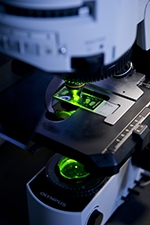Five months since its launch, the Tri-Institutional Therapeutics Discovery Institute is now seeking early-stage research projects for its drug discovery and development program designed to advance scientific breakthroughs into effective treatments for patients.

Tri-I TDI will expedite early- stage drug discovery into innovative treatments and therapies for patients. Credit: John Abbott
Investigators from Weill Cornell Medical College, Memorial Sloan-Kettering Cancer Center and The Rockefeller University whose discovery of small chemical molecules (the precursor of drugs) show the greatest promise for clinical application are encouraged to apply for the innovative program.
The goal of Tri-I TDI, which formed last October by the three academic institutions in partnership with Takeda Pharmaceutical Company, is to expedite early-stage drug discovery into innovative treatments and therapies for patients.
To accomplish this, Tri-I TDI pools institutional resources and funds to advance research projects that are too advanced for funding from the National Institutes of Health, but too preliminary to attract partners from venture capital firms or biopharmaceutical companies. This work will make possible all- important "proof of concept" studies—those that increase the likelihood that targeting a specific biologic pathway can favorably alter the course of a disease.
"The key here is to bridge a gap in the drug discovery continuum that many academic projects seem to fall into and never realize their full potential," said Dr. Michael Foley, the Sanders Director of the Tri-I TDI and director of its Sanders Innovation and Education Initiative.
Because of shortfalls in funding, scientists often struggle to develop a promising discovery to the point where it's attractive to potential industry partners for further research, development and commercialization. While grants from the NIH or other agencies fund basic science research, they often don't provide enough money to cover "proof of concept" studies. Without these data, companies are less willing to obtain licenses to test these discoveries in patients and ultimately bring them to market as treatments.
Working in conjunction with Takeda's medicinal chemists, housed on site in the Belfer Research Building, Tri-I TDI's investigators will develop and test small chemical molecules in an array of biological models — cellular, animal, perhaps even human — with the goal of generating this critical data.
"For a company to invest the kind of money that's required to move a compound into drug development and clinical trials, they require very strong scientific proof that this compound can successfully prevent disease or intervene in its progression," Dr. Foley said. "Tri-I TDI is designed to help investigators obtain as much scientific evidence as possible."
A scientific advisory board, which comprises scientific and thought leaders from the biopharmaceutical industry, venture capital community, and faculty of Weill Cornell, Rockefeller and MSKCC, will recommend projects for funding. Tri-I TDI's board of directors, which includes the leaders and one additional representative from each of the three academic institutions, will make the final decision. Project funding and duration will be determined on a case-by-case basis.
Letters of intent will be accepted through March 14. To apply or for more information, visit https://www.triitdi.org/applications/.
